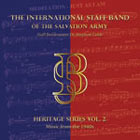 Heritage Series Volume 2: Music from the 1940s
Heritage Series Volume 2: Music from the 1940s
24-Sep-2010
The ISB turn back the clock with music from some of the most difficult years of their history - and show that it still stirs the heart.
International Staff Band
Conductor Doctor Stephen Cobb
SP&S Ltd: SPS 268 CD
Total playing time: 77.18 mins
The second volume in the International Staff Band’s Heritage Series covers music written for Salvation Army use in the 1940s - difficult years, as Ray Steadman-Allen points out in his accompanying essay, but ones that saw the emergence of new writers and the beginnings of developments in musical style and genre.
It is an unenviable task to pick out pieces that are truly representative, and the selection will not find favour with everyone: many items will be familiar, but one or two are less well known, and as such may be of particular interest.
Contrasting suites
This includes two suites, something of an innovation in Salvation Army terms, especially as both include a large proportion of original music.
’Portraits from St Paul’s Epistles’ by Bramwell Coles has received several recordings over the years, its four movements reflecting on characterisations drawn from St Paul’s letters to the early church.
Phil Catelinet’s ‘The Crusade of Youth’ is somewhat lighter in tone, and would not be out of place alongside such light music classics as Frederic Curzon’s, ‘Robin Hood Suite’, with the final movement in particular being somewhat reminiscent of that writer’s ‘March of the Bowmen’.
Colourful scoring
Also in a lighter mood is Ray Steadman-Allen’s own selection, ‘Wells of Gladness’ (or ‘Gladys’, as it is sometimes affectionately nicknamed!), making excellent use of the available tone colours of the band, with short answering phrases between various instruments and sections, and effective writing for the trombones.
This at around the same period that Emil Söderström was being criticised because his music did not produce enough of a homogenous sound!
A quartet of marches
Söderström himself is represented by one of the best of his marches, ‘Minneapolis IV’, exhibiting something of his energetic style of writing, with syncopation and harmonies with a touch of the “big band”.
A somewhat misunderstood figure, most of whose music was produced in the throw-away world of the National Broadcasting Company in Chicago, it will be interesting to see whether any of his more advanced works make it onto future volumes of this series.
’Star Lake’ (Eric Ball) and ‘Hadleigh Camp’ (Ray Steadman-Allen) were written in situ at band camps in the USA and UK respectively, but have retained their popularity over the years.
In rather more vigorous style is Wilfred Heaton’s ‘Praise’, mention being made of the impact made when it was introduced to the International Staff Band at the time.
Taken here at a suitably steady pace to enable the detail to come through, a couple of the runs still sound a little untidy, and it could have more of a lift towards the end.
The same composer’s meditation ‘Just as I am’, benefits from a spacious reading, with careful placing of notes, especially the cornet opening, and observance of dynamics.
Soloists to the fore
Derick Kane and Kevin Ashman are in good form in their solos: ‘Ransomed’ is very traditional, in the standard theme and variation format, with a reflective minor key section.
The title was changed when the band version appeared, having originally been published with piano accompaniment as ‘In Evil Long’, taken from the first line of the verses associated with the melody!
’Jubilate!’ is more adventurous, and still presents quite a challenge to today’s players, as the writer combines elements of variation with a variety of melodies, and Kevin’s bright tone matches the declamatory nature of the opening of the piece.
Mellow sounds
The more mellow tones of the band are heard in the trombone ensemble, ‘A Pilgrim Prayer’, a unison setting of the melody ‘None but the Weary Heart’, and Arthur Gullidge’s devotional selection ‘Divine Communion’.
Apart from the craftsmanship of the writing, its lasting popularity is possibly due to the fact that the songs included are still in use, unlike some other pieces of that era.
Valuable contribution
The presentation is good, apart from one transposition of letters that slipped past the proof-reader, although some may find the type face on the small side.
The conversation between Ray Steadman-Allen and Stephen Cobb, whilst not necessarily for repeated hearings, sheds some interesting light on the selection process and the composers featured.
Despite the inevitable duplication of certain tracks, this is another useful addition to the discography of The Salvation Army, either as a reminder of pieces played in former days, or as an introduction to the Army’s repertoire.
Roll on the 1950s!
Peter Bale
What's on this CD?
1. Praise, Wilfred Heaton, 2.57
2. A Pilgrim Prayer, Tchaikovsky arr. Ray Steadman-Allen, Andrew Justice, Lyndon Moorby, Stuart Hall and Bradley Turnbull (Trombones) , 3.37
3. Wells of Gladness, Ray Steadman-Allen, 5.26
4. Ransomed, George Marshall, Derick Kane (Euphonium), 6.25
Portraits from St Paul's Epistles, Bramwell Coles, 9.37
5. I. The Happy Man���������������
6. II. The Supplicant���������������
7. III. The Man of Valour���������������
8. IV. The Triumphant Man���������������
9. Hadleigh Camp, Ray Steadman-Allen, 3.19
10. Divine Communion, Arthur Gullidge, 7.21
11. Star Lake, Eric Ball, 2.35
12. Jubilate!, Arthur Gullidge, Kevin Ashman (Cornet), 7.26
13. Just As I Am, Wilfred Heaton, 5.35
The Crusade of Youth, Philip Catelinet, 10.25
14. I. The Torchbearer���������������
15. II. The Witness���������������
16. III. The Reverie���������������
17. IV. The Challenge���������������
18. Minneapolis IV, Emil Sˆderstrˆm, 3.18
19. In conversation, Lieut-Colonel Ray Steadman-Allen and Bandmaster Stephen Cobb, 7.58









